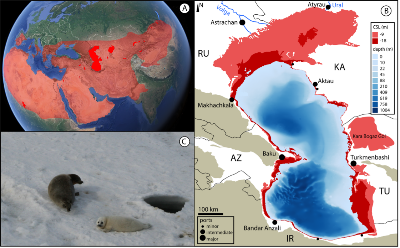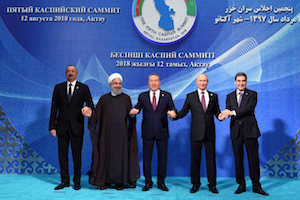Turkey-Backed Turkic States Challenge Russia's Hegemony in the Caspian Sea
By Syed Fazl-e-Haider
The Caspian Sea is increasingly emerging as a focal point of geopolitical competition. The joint military exercises conducted by Russia and Iran in July, following similar drills by Azerbaijan and Kazakhstan in the northern Caspian a month earlier, underscore the region’s rapid transformation into a nexus of strategic rivalries and evolving security alignments. Among the littoral states, Azerbaijan, Kazakhstan, and Turkmenistan are assuming particularly prominent roles in shaping the strategic landscape. Their efforts are supported by Turkey, which is facilitating the naval expansion of these three Turkic nations. Russia’s ongoing involvement in the war in Ukraine has significantly weakened Moscow’s capacity to assert dominance over the Caspian Sea and to effectively utilize it as part of the International North–South Transport Corridor (INSTC) linking Russia to Iran and India.
Credit: Wikimedia Commons
BACKGROUND: The Caspian Sea was widely regarded as a “Russian lake” during the Soviet era, as Iran, possessing only a short Caspian coastline, showed little interest in utilizing it for power projection. For decades, Russia’s Caspian Flotilla maintained dominance over the waters of the inland sea. After the Soviet Union’s dissolution in 1991, Moscow sought to preserve the existing balance of power in the Caspian. In 2018, Russia secured an agreement among the five Caspian littoral states on territorial delimitation, excluding the military presence of non-littoral actors in the sea.
The region experienced a significant geopolitical shift in 2020 after Azerbaijan’s victory in the 44-day war against Armenia over the Nagorno-Karabakh region. Turkey provided military assistance to Azerbaijan during the conflict. Following the Azerbaijan-Armenia war, the Caspian littoral states expanded their navies. Turkey continues to support Azerbaijan’s requirements for modern weapons, equipment, and ammunition. In 2023, Azerbaijan’s Defense Minister, Zakir Hasanov, affirmed that Ankara was Baku’s principal partner in military cooperation.
Over the past five years, Turkey has facilitated the naval expansion of Kazakhstan, Azerbaijan, and Turkmenistan. These countries, along with Kyrgyzstan and Uzbekistan, are members of the Turkey-backed “Pan-Turkic Union.” Through this framework, Turkey has assumed a leading role in diminishing Russia’s influence over the military development of these states.
In 2023, Turkey’s Asfar and YDA Group, together with Kazakhstan’s Uralsk Plant “Zenit” JSC, concluded an agreement for the construction of offshore platforms in the Caspian Sea. The agreement included the production of various naval vessels, including main surface combat ships, to fulfill the operational requirements of the Kazakh Navy. Likewise, the deepening relations between Turkey and Turkmenistan signify a broader shift in energy geopolitics and highlight their shared strategic interests. The Bayraktar TB2, Turkey’s first domestically produced unmanned combat aerial vehicle (UCAV), is deployed within Turkmenistan’s armed forces. In February, the two countries signed a gas supply agreement that offers Turkmenistan a new export channel while consolidating Turkey’s position as a regional energy hub.
In 2024, the joint military exercises Birleistik (Unity) 2024 were conducted at Kazakhstan’s Oymasha training ground and Cape Tokmak along the Caspian coast, marking the first such drills held without Russian participation. The armed forces of Azerbaijan, Kazakhstan, Kyrgyzstan, Tajikistan, and Uzbekistan jointly participated in the exercise.
In April, Azerbaijan and Kazakhstan announced plans to conduct the joint military exercises Caspian Breeze – 2025 in the northern part of the Caspian Sea near Russia’s coastline. The exercises commenced in June at Aktau, Kazakhstan, with the objective of strengthening the protection of maritime economic infrastructure, naval bases, and shipping routes. A month later, Russia and Iran initiated their own joint naval exercises, CASAREX 2025, under the banner “Together for a Safe and Secure Caspian Sea.” These drills were designed to enhance maritime security and promote deeper naval cooperation between the two states.
The two joint military exercises within the span of a single month demonstrate a changing regional balance of power. The Caspian littoral states have expanded their naval capabilities in recent years, thereby challenging Russia’s long-standing hegemony in the Caspian region.
IMPLICATIONS: The navies of the three Turkic littoral states, Azerbaijan, Kazakhstan, and Turkmenistan, have experienced substantial growth and deepened cooperation in recent years. Through a series of bilateral and multilateral security agreements and supported by Turkey, these states have enhanced their strategic position vis-à-vis Russia. These developments have not only strengthened the collective influence and military capacity of the Turkic states but have also posed a significant challenge to Russia’s longstanding naval dominance in the Caspian.
Security cooperation among the three Turkic littoral states in the absence of Russian participation signifies a major geopolitical realignment in the Caspian region. For instance, Azerbaijan and Turkmenistan have agreed to employ their joint naval forces to protect pipelines on the seabed and vessels operating on the surface. The regional geopolitical competition is likely to intensify following Iran’s decision to resume drilling operations in the Caspian after a 30-year hiatus. This development could generate tensions with the three Turkic littoral states, which are already deeply engaged in offshore oil and gas extraction within the Caspian Sea.
Turkey plays a pivotal role in the ongoing militarization of the Caspian Sea. It initially strengthened Azerbaijan’s defense capabilities, subsequently supported Turkmenistan, and is now actively engaged in enhancing Kazakhstan’s naval power. According to Yuri Lyamin, an analyst at the Center for Analysis of Strategies and Technologies (CAST), “Kazakhstan is following the ongoing, multi-year process of strengthening the navies of Caspian states. The reasons and necessity of this can be debated, but it is a long-standing trend driven by prestige and the desire to keep up with its neighbors. Over the past decade and a half, Turkmenistan has built a very strong navy in the Caspian, including with Turkey’s assistance. It was to a Turkish design that Turkmenistan’s largest ship, and one of the largest warships in the Caspian, the corvette Deniz Khan, was commissioned and constructed in 2021. A considerable number of missile, missile-artillery, and other boats for the Turkmen border guards were also built based on Turkish designs.” The growing number of actors in the region is complicating Moscow’s ability to utilize the area for strategic connectivity projects. One of these is the International North–South Transport Corridor (INSTC), a Russia-led project designed to connect Russian ports with Iran, the Gulf region, and the Indian Ocean. The INSTC agreement was initially signed in 2000 by Russia, Iran, and India, was later joined by Azerbaijan and several Central Asian states. Meanwhile, Iran is actively seeking alternative trade routes to the EU, including via Armenia.
Conversely, Azerbaijan’s Port of Baku serves as a critical hub within the east–west Trans-Caspian Middle Corridor, which links China to the EU via Central Asia and the South Caucasus, thereby bypassing Russia. The Middle Corridor endows Baku’s with an important role for both Europe and Central Asia by providing a viable alternative to Russian transit routes, facilitating efficient east–west connectivity across the Caspian and through the South Caucasus.
Similarly, Turkey promotes the integration of Turkmenistan in the Middle Corridor, which would advance Turkey’s long-standing ambition to position itself as a strategic logistical bridge linking Asia and Europe.
The 2018 agreement grants the Caspian states the right to construct gas pipelines across the seabed. Ankara aims to channel Caspian gas to its territory via Azerbaijan, and onward to the EU, elevating Turkey’s role as a pivotal energy hub. However, this directly contradicts Russian interests and the potential exists for heightened tensions or even confrontation between the Turkey-backed Turkic states and the Russia-Iran alliance over control of the Caspian Sea’s energy resources.
CONCLUSIONS: The geopolitical competition between the three Turkey-backed Turkic littoral states and the Russia–Iran alliance could intensify as both sides continue to expand their economic and military presence in the Caspian region. The increase in military exercises conducted over the past two years underscores the emergence of new security alignments within the Caspian basin.
Turkey has taken on a leading role in advancing the naval capabilities of the three Turkic littoral states, a position that was traditionally held by Russia. As Turkey’s involvement in the region deepens, Moscow’s ability to shape the military development of these countries will likely be further marginalized. Russia, meanwhile, continues to bear significant geopolitical costs for its full-scale invasion of Ukraine in 2022. Since the onset of the conflict, Moscow’s influence across Central Asia and other regions, including the Caspian, has steadily declined and other powers such as China and Turkey have begun to fill the resulting vacuum.
AUTHOR’S BIO: Syed Fazl-e-Haider is a Karachi-based analyst at the Wikistrat. He is a freelance columnist and the author of several books. He has contributed articles and analysis to a range of publications. He is a regular contributor to Eurasia Daily Monitor of Jamestown Foundation Email,
This email address is being protected from spambots. You need JavaScript enabled to view it.
A New Spring for Caspian Transit and Trade
Svante E. Cornell and Brenda Shaffer
October 17, 2023
Major recent shifts, starting with the Taliban victory in Afghanistan and Russia’s war in Ukraine have led to a resurgence of the Trans-Caspian transportation corridor. This corridor, envisioned in the 1990s, has been slow to come to fruition, but has now suddenly found much- needed support. The obstacles to a rapid expansion of the corridor’s capacity are nevertheless considerable, given the underinvestment in its capacity over many years.

Decreasing Water Levels in the Caspian Sea: Causes and Implications
By Vali Kaleji
October 13, 2023
Various reports indicate that the water level of the Caspian Sea has decreased by one meter in recent years and could drop by 9 to 18 meters (30 to 59 feet) by the end of the 21st century. Although climate change contributes to this process, Russia’s construction of dams on the Volga River has played an important role in reducing the amount of water entering the Caspian Sea. This will have significant and serious implications, including a decline of the sea water level, a considerable retreat of the sea and increase of the land and coastal area especially in upstream countries (Russia and Kazakhstan), challenges to the operation of ports and shipping, as well as environmental consequences, particularly the drying of protected areas and wetlands.

Turkmenistan Lifts Its Head
By S. Frederick Starr
December 2, 2022
In recent months Turkmenistan has emerged from its self-imposed shell. Under its new president, Serdar Berdimuhamedov, it has launched a very active, though still cautious, foreign policy. While reaffirming its neutral status, which the UN recognized in 1995, it has intensified its relations with all the global powers and, significantly, with its neighbors as well. Both the U.S. and EU have applauded these initiatives and the new president’s strategic concept that underlies them. However, events unfold, Turkmenistan has decisively lifted its head, and will henceforth be a significant factor in regional and continental affairs and not simply a perplexing outlier.

New Vistas for Trans-Caspian Projects
By Stephen Blank
December 10, 2019, the CACI Analyst
The Caspian Convention of August 2018 represented a major step forward in demarcating the Caspian Sea and the rights of littoral states. It also regenerated thinking about large-scale projects to integrate the Caspian basin with European, Chinese, and South Asian markets. This agreement was part of a larger contemporary trend involving China’s Belt and Road Initiative (BRI) and Russia’s North-South project through Iran and Central Asia to India. However, it will take years of multilateral economic, technological, and political efforts to implement these visions and despite the optimistic dreams fostered by the Caspian convention, there will be many disappointments on the road to realizing them.



